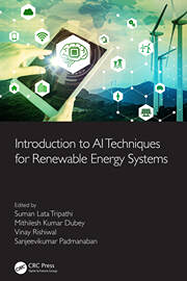Introduction to AI Techniques for Renewable Energy Systems
Material type: TextLanguage: English Publication details: Boca Raton, FL : CRC Press, c2021Edition: 1stDescription: XII, 410 p. : illISBN:
TextLanguage: English Publication details: Boca Raton, FL : CRC Press, c2021Edition: 1stDescription: XII, 410 p. : illISBN: - 9780367610920
- 621.042028563 TRI
| Item type | Current library | Shelving location | Call number | Copy number | Status | Date due | Barcode |
|---|---|---|---|---|---|---|---|
 Reference Collection
Reference Collection
|
Reference Section | Reference Section | 621.042028563 TRI | 2022-23 | Available | 98116 | |
 Reference Collection
Reference Collection
|
Reference Section | Reference Section | 621.042028563 TRI | 2023-24 | Available | 98439 |
Biography
Suman Lata Tripathi is working as a Professor at School of Electronics and Electrical Engineering, Lovely Professional University, India.
Mithilesh Kumar Dubey is working as an Associate Professor at School of Computer Science and Engineering, Lovely Professional University, India.
Vinay Rishiwal is working as a Professor at Department of Computer Science and Information Technology, Faculty of Engineering and Technology, MJP Rohilkhand University, Bareilly, Uttar Pradesh, India.
Sanjeevikumar Padmanaban is working as a faculty member, at Department of Energy Technology, Aalborg University, Esbjerg, Denmark.
SUMMARY:
Introduction to AI techniques for Renewable Energy System
Artificial Intelligence (AI) techniques play an essential role in modeling, analysis, and prediction of the performance and control of renewable energy. The algorithms used to model, control, or predict performances of the energy systems are complicated, involving differential equations, enormous computing power, and time requirements. Instead of complex rules and mathematical routines, AI techniques can learn critical information patterns within a multidimensional information domain. Design, control, and operation of renewable energy systems require a long-term series of meteorological data such as solar radiation, temperature, or wind data. Such long-term measurements are often non-existent for most of the interest locations or, wherever they are available, they suffer from several shortcomings, like inferior quality of data, and in-sufficient long series. The book focuses on AI techniques to overcome these problems. It summarizes commonly used AI methodologies in renewal energy, with a particular emphasis on neural networks, fuzzy logic, and genetic algorithms. It outlines selected AI applications for renewable energy. In particular, it discusses methods using the AI approach for prediction and modeling of solar radiation, seizing, performances, and controls of the solar photovoltaic (PV) systems.
Features
Focuses on a significant area of concern to develop a foundation for the implementation of renewable energy system with intelligent techniques
Showcases how researchers working on renewable energy systems can correlate their work with intelligent and machine learning approaches
Highlights international standards for intelligent renewable energy systems design, reliability, and maintenance
Provides insights on solar cell, biofuels, wind, and other renewable energy systems design and characterization, including the equipment for smart energy systems
This book, which includes real-life examples, is aimed at undergraduate and graduate students and academicians studying AI techniques used in renewal energy systems.
